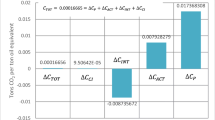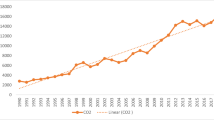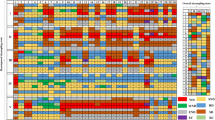Abstract
This paper applied the Tapio and LMDI methods based on an extended Kaya identity, to evaluate the decoupling and factors that influenced the relationship between economic growth and CO2 emissions in Cameroon from 1990 to 2015. The analysis covered the two main sectors of Cameroon’s economic activity, and the decoupling indicators were broken down into five factors. The results showed that Cameroon performed weak decoupling throughout this study period. A weak negative decoupling and a strong negative decoupling appeared during the periods 1990–1992 and 1993–1994, whereas a strong decoupling occurred only from 1994 to 1995 and between 2004 and 2006. From a general point of view, we found that demographic change, followed by energy intensity and economic activity, played a negative role in decoupling, while economic structure and emission factors had promoted the development of decoupling. A comparative analysis of the industrial and tertiary sectors revealed that industrial growth determined the degree of decoupling of CO2 emissions from Cameroon’s economic growth. The policy will need to optimize and significantly adjust the energy and industrial structures if Cameroon’s 2035 emission reduction targets are to be reached. This requires a change in Cameroon’s energy consumption and economic development pathways for optimal outcomes.




Similar content being viewed by others
References
Al V et al (2007) Linking analyses and environmental Kuznets curves for aggregated material flows in the EU. J Clean Prod 15(17):1662–1673 Available at: http://www.sciencedirect.com/science/article/pii/S0959652606003179
Ang BW (1995) Decomposition methodology in industrial energy demand analysis. Energy 20(11):1081–1095 Available at: http://www.sciencedirect.com/science/article/pii/036054429500068R
Ang BW (2004) Decomposition analysis for policymaking in energy: which is the preferred method? Energy Policy 32(9):1131–1139 Available at: http://www.sciencedirect.com/science/article/pii/S0301421503000764
Ang BW (2005) The LMDI approach to decomposition analysis: a practical guide. Energy Policy 33(7):867–871 Available at: https://www.sciencedirect.com/science/article/pii/S0301421503003136
Ang BW (2015) LMDI decomposition approach: a guide for implementation. Energy Policy, 86(Supplement C), pp.233–238. Available at: http://www.sciencedirect.com/science/article/pii/S0301421515300173
Ang BW, Choi K-H (1997) Decomposition of aggregate energy and gas emission intensities for industry: a refined Divisia index method. Energy J 18(3):59–73 Available at: https://www.jstor.org/stable/41322738
Ang BW, Lee SY (1994) Decomposition of industrial energy consumption: some methodological and application issues. Energy Econ 16(2):83–92 Available at: http://www.sciencedirect.com/science/article/pii/0140988394900019
Ang BW, Liu FL (2001) A new energy decomposition method: perfect in decomposition and consistent in aggregation. Energy 26(6):537–548 Available at: http://www.sciencedirect.com/science/article/pii/S0360544201000226
Ang BW, Zhang FQ (2000) A survey of index decomposition analysis in energy and environmental studies. Energy 25(12):1149–1176 Available at: http://www.sciencedirect.com/science/article/pii/S0360544200000396
Ang BW, Zhang FQ, Choi K-H (1998) Factorizing changes in energy and environmental indicators through decomposition. Energy 23(6):489–495 Available at: http://www.sciencedirect.com/science/article/pii/S0360544298000164
Asongu S, El Montasser G, Toumi H (2016) Testing the relationships between energy consumption, CO2 emissions, and economic growth in 24 African countries: a panel ARDL approach. Environ Sci Pollut Res 23(7):6563–6573
Boyd G et al (1987) Separating the changing composition of US manufacturing production from energy efficiency improvements: a Divisia index approach. Energy J 8(2):77–96 Available at: https://www.jstor.org/stable/41322261
Boyd GA, Hanson DA, Sterner T (1988) Decomposition of changes in energy intensity: a comparison of the Divisia index and other methods. Energy Econ 10(4):309–312 Available at: http://www.sciencedirect.com/science/article/pii/0140988388900424
Bruyn (1997) Developments in the throughput-income relationship: theoretical and empirical observations. Ecol Econ 20(3):255–268 Available at: http://www.sciencedirect.com/science/article/pii/S0921800996000869
Cansino JM, Sánchez-Braza A, Rodríguez-Arévalo ML (2015) Driving forces of Spain’s CO2 emissions: a LMDI decomposition approach. Renew Sust Energ Rev 48:749–759 Available at: https://www.sciencedirect.com/science/article/pii/S1364032115002816
CIA (2018) The World Factbook—central intelligence agency. Central Intelligence Agency (US) Available at: https://www.cia.gov/library/publications/the-world-factbook/geos/pe.html
Climent F, Pardo A (2007) Decoupling factors on the energy–output linkage: the Spanish case. Energy Policy 35(1):522–528 Available at: http://www.sciencedirect.com/science/article/pii/S0301421505003708
CNI (1994) Climate change governance in Cameroon official doc. UNFCCC-CAMEROON, p.160. Available at: http://unfccc.int/resource/docs/natc/cmrnc1f.pdf
Cogneau D, Herrera J (1995) IA DEVALUATION DU FCFA AU CAMEROUN:Bilan et perspectives. , p.23. Available at: http://horizon.documentation.ird.fr/exl-doc/pleins_textes/pleins_textes_6/b_fdi_35-36/41779.pdf
Cui E, Ren L, Sun H (2016) Analysis of energy-related CO2 emissions and driving factors in five major energy consumption sectors in China. Environ Sci Pollut Res 23(19):19667–19674. https://doi.org/10.1007/s11356-016-7081-7
Danish, Baloch MA, Suad S (2018) Modeling the impact of transport energy consumption on CO2 emission in Pakistan: evidence from ARDL approach. Environ Sci Pollut Res 25(2009):9461–9473
De Freitas LC, Kaneko S (2011) Decomposition of CO2 emissions change from energy consumption in Brazil: challenges and policy implications. Energy Policy 39(3):1495–1504 Available at: https://www.sciencedirect.com/science/article/pii/S0301421510009237
Dong B, Zhang M, Mu H, Su X (2016) Study on decoupling analysis between energy consumption and economic growth in Liaoning Province. Energy Policy 97:414–420 Available at: http://www.sciencedirect.com/science/article/pii/S0301421516304153
Fan Y, Liu LC, Wu G, Wei YM (2006) Analyzing impact factors of CO2 emissions using the STIRPAT model. Environ Impact Assess Rev 26(4):377–395 Available at: https://www.sciencedirect.com/science/article/abs/pii/S0195925506000059
Feng K, Davis SJ, Sun L, Hubacek K (2015) Drivers of the US CO2 emissions 1997–2013. Nat Commun 6:7714 Available at: http://www.nature.com/doifinder/10.1038/ncomms8714
GCA (2016) CO2 territorial emissions in 2013 (MtCO2). Global Carbon Atlas 2013:–3 Available at: http://www.globalcarbonatlas.org/en/CO2-emissions
Hammond GP, Norman JB (2012) Decomposition analysis of energy-related carbon emissions from UK manufacturing. Energy 41(1):220–227 Available at: https://www.sciencedirect.com/science/article/pii/S036054421100421X
Hilaire N, Hervé KF (2012) TITRE: effets de la croissance économique sur les émissions de CO 2 dans les Pays du Bassin du Congo. , pp.1–17. Available at: http://www.ecoasso.org/articles/Nkengfa_et_Kaffo_Fotio.pdf
Hilaire N, Hervé KF, François K (2014) Atmospheric pollution and economic growth in Cameroon. Journal of International Business and Economics 2(3):171–187 Available at: http://jibe-net.com/journals/jibe/Vol_2_No_3_September_2014/8.pdf
IEA (2017) CO2 emissions from fuel combustion. Oecd/Iea, pp1–155. Available at: https://www.iea.org/publications/freepublications/publication/CO2EmissionsfromFuelCombustionHighlights2017.pdf
IEA-CMR (2018) Cameroon International Energy Agency Balances. Available at: https://www.iea.org/countries/non-membercountries/cameroon/
INDC-CMR (2015) Republique Du Cameroun Contribution Prevue Determinee Au Plan National (Cpdn) Intended Nationally Determined Contribution (Indc). Population, M W Us, Mds Cpdn, La Industrialis, Nouveau Pays, pp.1–17. Available at: http://www4.unfccc.int/ndcregistry/PublishedDocuments/Cameroon First/CPDN CMR Final.pdf
IPCC (2006) CHAPTER 1:Guidelines, Ipcc Greenhouse, National Inventories, Gas. Available at: https://www.ipcc-nggip.iges.or.jp/public/2006gl/pdf/2_Volume2/V2_1_Ch1_Introduction.pdf
IPCC (2014) Climate change 2014: synthesis report. Contribution of Working Groups I, II and III to the Fifth Assessment Report of the Intergovernmental Panel on Climate Change, Available at: https://www.ipcc.ch/pdf/assessment-report/ar5/syr/SYR_AR5_FINAL_full_wcover.pdf
İpek Tunç G, Türüt-Aşık S, Akbostancı E (2009) A decomposition analysis of CO2 emissions from energy use: Turkish case. Energy Policy 37(11):4689–4699 Available at: http://www.sciencedirect.com/science/article/pii/S0301421509004388
Jeong K, Kim S (2013) LMDI decomposition analysis of greenhouse gas emissions in the Korean manufacturing sector. Energy Policy 62:1245–1253 Available at: https://www.sciencedirect.com/science/article/pii/S0301421513005843
Karmellos M, Kopidou D, Diakoulaki D (2016) A decomposition analysis of the driving factors of CO2 (carbon dioxide) emissions from the power sector in the European Union countries. Energy 94:680–692 Available at: https://www.sciencedirect.com/science/article/pii/S0360544215015406
Kaya Y (1990) Impact of carbon dioxide emission on GNP growth: interpretation of proposed scenarios. Paris: Presentation to the Energy and Industry Subgroup, Response Strategies Working Group, IPCC. X’Pert Stress PW3208, Software for Residual stress analysis, PANalytical, The Netherlands, www.panalytical.com . Available at: http://www.wiki.nus.edu.sg
Li W, Li H et al (2015a) The analysis of CO2 emissions and reduction potential in China’s transport sector. Math Probl Eng 1:1–12
Li W, Sun S, Li H (2015b) Decomposing the decoupling relationship between energy-related CO2 emissions. Nat Hazards 79(2):977–997 Available at: https://link.springer.com/article/10.1007/s11069-015-1887-3#citeas
Li X et al (2017) Carbon dioxide emissions from the electricity sector in major countries: a decomposition analysis. Environ Sci Pollut Res:1–12
Liu XQ, Ang BW, Ong HL (1992) The application of the Divisia index to the decomposition of changes in industrial energy consumption. Energy J 13(4):161–177 Available at: https://www.jstor.org/stable/41322473
Marchal V et al. (2011) OECD environmental outlook to 2050: climate change chapter. Oecd, (November), p.90. Available at: https://www.oecd.org/env/cc/49082173.pdf
Meng M, Fu Y, Wang X (2018) Decoupling, decomposition and forecasting analysis of China’s fossil energy consumption from industrial output. J Clean Prod 177:752–759 Available at: http://www.sciencedirect.com/science/article/pii/S0959652617332729
Mousavi B, Lopez NSA, Biona JBM, Chiu ASF, Blesl M (2017) Driving forces of Iran’s CO2 emissions from energy consumption: an LMDI decomposition approach. Appl Energy 206(August):804–814 Available at: https://www.sciencedirect.com/science/article/pii/S0306261917312321
Noubissi Domguia E, Njangang H (2017) Croissance économique et dégradation de l’environnement au Cameroun: Croissance économique et dégradation de l’environnement. Afr Dev Rev 29:615–629 Available at: http://onlinelibrary.wiley.com/doi/10.1111/1467-8268.12300/epdf?r3_referer=wol&tracking_action=preview_click&show_checkout=1&purchase_referrer=onlinelibrary.wiley.com&purchase_site_license=LICENSE_DENIED_NO_CUSTOMER
O’Mahony T (2013) Decomposition of Ireland’s carbon emissions from 1990 to 2010: an extended Kaya identity. Energy Policy 59:573–581 Available at: https://www.sciencedirect.com/science/article/pii/S0301421513002504
Obadi SM, Korček M (2016) Drivers of CO2 emissions in the Slovak economy: the logarithmic mean Divisia index approach of decomposition. Ekonomicky Casopis 64(4):331–352 Available at: http://cejsh.icm.edu.pl/cejsh/element/bwmeta1.element.cejsh-005f273a-4ebd-472b-b20e-1248562d1e48
OECD (2010) Indicators to measure decoupling of environmental pressure from economic growth. Sustainable development. Available at: SG/SD (2002)%0A1/final. http://www.olis.oecd.org/olis/2002doc.nsf/LinkTo/sg-sd(2002)1-final
OECD-AfDB (2001) African economic outlook. OECD-AfDB:71–82 Available at: https://www.oecd.org/dev/africa/32412420.pdf
Reitler W, Rudolph M, Schaefer H (1987) Analysis of the factors influencing energy consumption in industry: a revised method. Energy Econ 9(3):145–148 Available at: http://www.sciencedirect.com/science/article/pii/0140988387900193
Roinioti A, Koroneos C (2017) The decomposition of CO2 emissions from energy use in Greece before and during the economic crisis and their decoupling from economic growth. Renew Sust Energ Rev 76(March):448–459 Available at: https://www.sciencedirect.com/science/article/pii/S1364032117303404
Román-Collado R, Morales-Carrión AV (2018) Towards a sustainable growth in Latin America: a multiregional spatial decomposition analysis of the driving forces behind CO2 emissions changes. Energy Policy 115:273–280 Available at: https://www.sciencedirect.com/science/article/pii/S0301421518300193
Sumabat AK, Lopez NS, Yu KD, Hao H, Li R, Geng Y, Chiu ASF (2016) Decomposition analysis of Philippine CO2 emissions from fuel combustion and electricity generation. Appl Energy 164:795–804 Available at: https://www.sciencedirect.com/science/article/pii/S0306261915015962
Sun C, Ding D, Yang M (2017) Estimating the complete CO2 emissions and the carbon intensity in India: from the carbon transfer perspective. Energy Policy 109:418–427 Available at: https://www.sciencedirect.com/science/article/pii/S0301421517304536
Tamba JG, Njomo D (2012) Assessment of greenhouse gas emissions in Cameroon ’ s road transport sector. Abstract: 2.1 Population and gross product: domestic. Univers J Environ Res Technol 2(6):475–488 Available at: http://www.environmentaljournal.org/2-6/ujert-2-6-3.pdf
Tapio P (2005) Towards a theory of decoupling: degrees of decoupling in the EU and the case of road traffic in Finland between 1970 and 2001. Transp Policy 12(2):137–151 Available at: http://www.sciencedirect.com/science/article/pii/S0967070X05000028
UNEP (2016) Cameroon: consumption, energy resources, energy. (Table 1), pp. 2013–2016. Available at: https://wedocs.unep.org/bitstream/handle/20.500.11822/20487/Energy_profile_Cameroon.pdf?sequence=1&isAllowed=y
UNFCCC (2015) Paris Agreement. Conference of the Parties on its twenty-first session, 21932(December), p.32. Available at: http://unfccc.int/resource/docs/2015/cop21/eng/l09r01.pdf
Vehmas J, Malaska P, Luukkanen J, Kaivo-oja J, Hietanen O, Vinnari M, Ilvonen J (2003) Europe in the global battle of sustainability: rebound strikes back?—advanced sustainability analysis, publications of the Turku School of Economics and Business Administration, Series discussion and working papers 7:2003, Turku. Available at: https://scholar.google.fi/citations?user=XkxembsAAAAJ&hl=en
Wang M, Feng C (2017) Decomposition of energy-related CO2 emissions in China: an empirical analysis based on provincial panel data of three sectors. Applied Energy, 190(supplement C), pp.772–787. Available at: http://www.sciencedirect.com/science/article/pii/S0306261917300090
Wang Q, Hang Y, Zhou P, Wang Y (2016) Decoupling and attribution analysis of industrial carbon emissions in Taiwan. Energy 113:728–738 Available at: http://www.sciencedirect.com/science/article/pii/S0360544216310337
WDI (2018) World development indicators | DataBank. The World Bank. Available at: http://databank.worldbank.org/data/reports.aspx?source=world-development-indicators#advancedDownloadOptions
Wu Y, Zhu Q, Zhu B (2018) Decoupling analysis of world economic growth and CO2 emissions: a study comparing developed and developing countries. J Clean Prod 190:94–103 Available at: http://www.sciencedirect.com/science/article/pii/S0959652618311661
Zerbo E (2017) Income-environment relationship in sub-Saharan African countries: further evidence with trade openness. Environ Sci Pollut Res 24(19):16488–16502
Zhang M, Song Y, Su B, Sun X (2015) Decomposing the decoupling indicator between the economic growth and energy consumption in China. Energy Efficiency, Available at: https://link.springer.com/article/10.1007/s12053-015-9348-0#citeas, 8, 1231, 1239
Zhang Z (2000) Decoupling China’s carbon emissions increase from economic growth: an economic analysis and policy implications, 28(4)
Zhao X, Zhang X, Li N, Shao S, Geng Y (2017) Decoupling economic growth from carbon dioxide emissions in China: a sectoral factor decomposition analysis. J Clean Prod 142:3500–3516 Available at: http://www.sciencedirect.com/science/article/pii/S0959652616317462
Zhong TY, Huang XJ, Han L, W.B. (2010) Review on the research of decoupling analysis in the field of environments and resource. Available at: http://en.cnki.com.cn/Article_en/CJFDTOTAL-ZRZX201008016.htm
Acknowledgments
The author would like to dedicate this work to Mrs. Seraphine ZEH and Mr. Samuel NGBWA for their multiple contributions. We would like to thank the supervisor of this study, Professor Dr. Yi-Ming Wei, to BIT-CEEP in China; and all those who are in charge of the scientific evaluation of this work, and more particularly editors and reviewers.
Author information
Authors and Affiliations
Corresponding author
Ethics declarations
Conflict of interest
The authors declare that they have no conflict of interest.
Additional information
Responsible editor: Nicholas Apergis
APPENDIX 1
APPENDIX 1
Rights and permissions
About this article
Cite this article
Engo, J. Decomposing the decoupling of CO2 emissions from economic growth in Cameroon. Environ Sci Pollut Res 25, 35451–35463 (2018). https://doi.org/10.1007/s11356-018-3511-z
Received:
Accepted:
Published:
Issue Date:
DOI: https://doi.org/10.1007/s11356-018-3511-z




